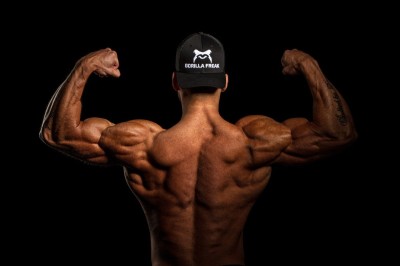Dying to look good

Years ago, I walked into the gym for a workout and noticed a bulletin posted at the back. It said the gym owner had unexpectedly died the previous day.
What made his death more awful was that he was in his early 30’s and had a young wife as well as a 3-year old daughter. A guy I knew at the gym talked to the owner’s attending ER physician who told him that the guy’s heart was more than twice its normal size.
I wish I could tell you this was an extremely rare occurrence, but sadly it isn’t. In fact, 2021 may go down as the worst year ever for athlete/bodybuilder deaths.
Shawn Rhoden was perhaps the biggest name to pass away this year. He had won the Mr. Olympia title (the most prestigious in the sport) only three years earlier and was 46.
Just days later, George Peterson, another professional bodybuilder with wins under his belt, died at 37. Sofia Graham, a champion contender, died while prepping for a contest at the age of 27.
Seasoned champ Alena Hatvani died at 46 leaving behind her husband and children. Competitor Megan Elizabeth died at age 28.
Particularly upsetting to me was the death of John Meadows (age 49), whose YouTube channel I consistently followed. Meadows was extremely knowledgeable and experienced, having been a professional for many years before training other winning athletes and starting his own supplement company.
Why?
I put myself through my undergrad college program as a fitness trainer at several gyms and also competed in a couple of bodybuilding competitions. Even at my own gyms, which were far outside the major pro bodybuilding spotlight, I witnessed some pretty terrible things. I saw guys experiencing sterility, having to undergo very embarrassing surgeries because their bodies stopped producing their own testosterone, women whose facial features had morphed into something unnatural, and more.
And for what? All because they wanted to look good; very good.
Steroid usage in sports has been widely acknowledged for a long time, but today, things are worse. Now the term typically used is “gear,” which denotes not only steroids but a wide array of other drugs used in combination to enhance muscle vascularity, rapidly rid the body of water, and more.
Continual gear usage is a lethal bet athletes make that doesn’t involve “if” so much as “when” they’ll suffer the severe consequences of winning at any cost.
It used to be that competitors only introduced drugs into their routine as they neared an event. However, now many use gear year-round because, primarily, they can’t handle how they look without it. It’s devolved into a personal pride thing and/or a perceived necessity to promote their fitness business and persona.
Of course, gear usage is just one example of people going to extremes to produce the looks they desire. The news is swollen with stories of cosmetic surgeries gone wrong and other appearance-altering attempts that have had tragic end results.
The Bible on our bodies
The Bible has very little to say on the subject of health and exercise, clearly prioritizing spiritual training over the physical: “On the other hand, discipline yourself for the purpose of godliness; for bodily discipline is only of little profit, but godliness is profitable for all things, since it holds promise for the present life and also for the life to come” (1 Tim. 4:7-8).
That said, although “our outer man is decaying” (2 Cor. 4:16), Scripture says that – while negatively impacted by sin – our bodies are still a good thing. Unlike the Gnostics who believed that only spirit is good and therefore our physical persons were bad, the Bible clearly shows that our bodies are an integral part of our creation, with God going so far as to decree a resurrection of our bodies at the end of time.
Scripture states it is natural for us to care for our bodies; one example is found in Paul’s illustration on marriage: “So husbands ought also to love their own wives as their own bodies. He who loves his own wife loves himself for no one ever hated his own flesh, but nourishes and cherishes it” (Eph. 5:28-29).
However, just like eating is blessed by God but gluttony is sinful, going too far with “nourishing” our bodies can quickly lead to the sins of vanity and pride. You might think it’s not easy for Christians to fall into trouble here, but you’d be wrong.
Several years ago, a Christian bodybuilder friend of mine who was around my age suddenly died. I could tell by looking at him that he was on some sort of gear and learned shortly thereafter that the cause of his death was heart-related. He was too experienced to not know the dangers, but he went forward anyway.
So, my plea to you is this: by all means, take care of your physical body – adhering to a dedicated exercise, health, and eating plan typically produces nothing but positive benefits. But don’t let pride and vanity lure you down an extreme road where you get to the point of literally dying to look good.
Robin Schumacher is an accomplished software executive and Christian apologist who has written many articles, authored and contributed to several Christian books, appeared on nationally syndicated radio programs, and presented at apologetic events. He holds a BS in Business, Master's in Christian apologetics and a Ph.D. in New Testament. His latest book is, A Confident Faith: Winning people to Christ with the apologetics of the Apostle Paul.





























